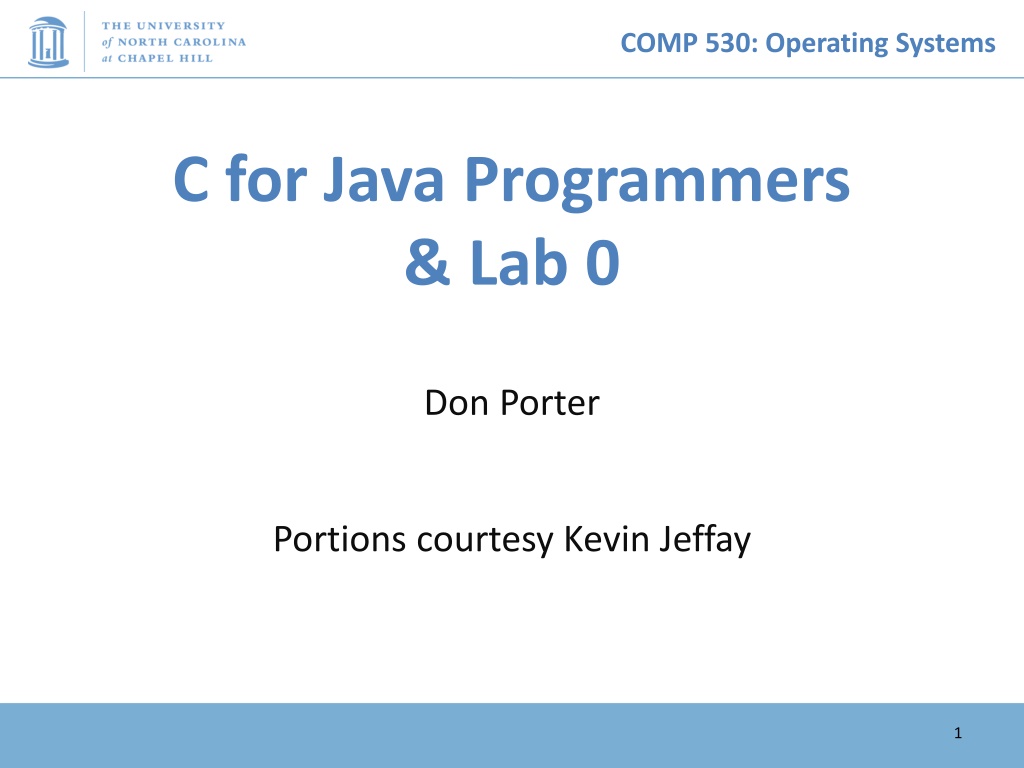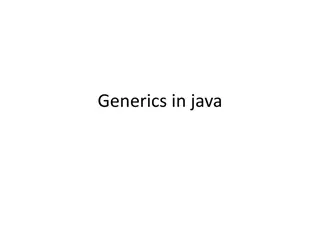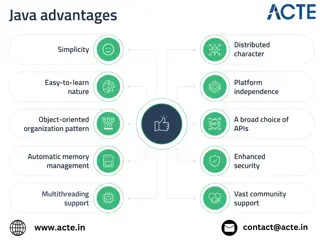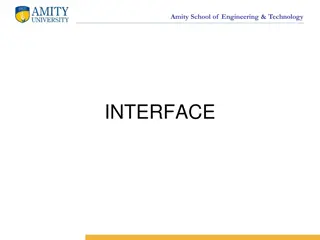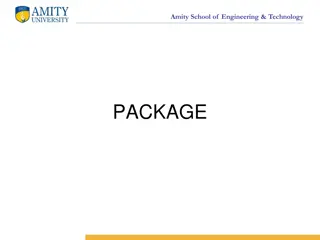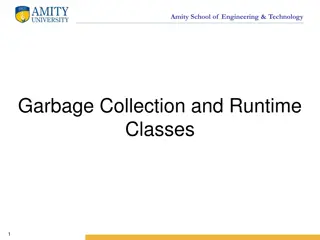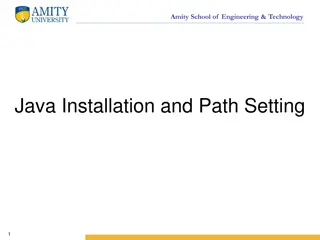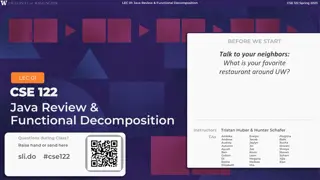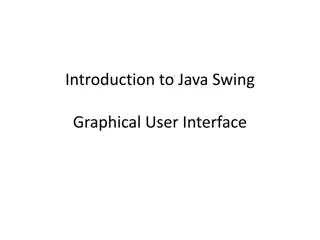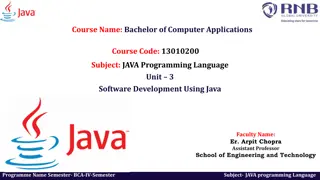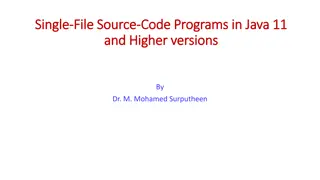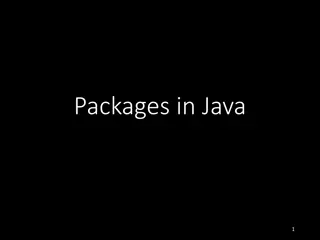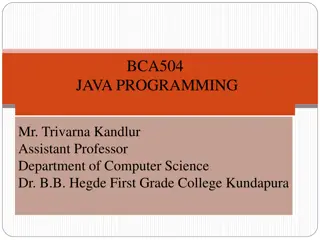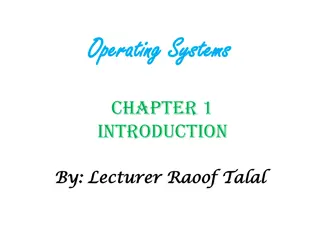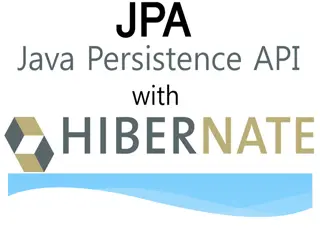Understanding Operating Systems in C for Java Programmers
This content delves into the intricacies of operating systems using C programming language, aimed at Java programmers. It covers basic syntax, data types, pointers, memory placement, function pointers, and more, providing a comprehensive overview with examples and explanations.
Download Presentation

Please find below an Image/Link to download the presentation.
The content on the website is provided AS IS for your information and personal use only. It may not be sold, licensed, or shared on other websites without obtaining consent from the author. Download presentation by click this link. If you encounter any issues during the download, it is possible that the publisher has removed the file from their server.
E N D
Presentation Transcript
COMP 530: Operating Systems C for Java Programmers & Lab 0 Don Porter Portions courtesy Kevin Jeffay 1
COMP 530: Operating Systems Same Basic Syntax Data Types: int, char, [float] void - (untyped pointer) Can create other data types using typedef No Strings - only char arrays Last character needs to be a 0 Not 0 , but \0
COMP 530: Operating Systems struct C s object typedef struct foo { int a; void *b; void (*op)(int c); // function pointer } foo_t; // <------type declaration Actual contiguous memory Includes data and function pointers
COMP 530: Operating Systems Pointers Memory placement explicit (heap vs. stack) Two syntaxes (dot, arrow) int main { struct foo f; struct foo *fp = &f; f.a = 32; // dot: access object directly fp->a = 33; // arrow: follow a pointer fp = malloc(sizeof(struct foo)); fp->a = 34; } Stack Heap main: f: a = 32; b = NULL; op = NULL; op = NULL; f: a = 33; b = NULL; struct foo: a = 34; b = NULL; f: a = 0; b = NULL; op = NULL; struct foo: a = 0; b = NULL; op = NULL; op = NULL; Ampersand: Address of f PC fp: struct foo { int a; void *b; void (*op)(int c); } 4
COMP 530: Operating Systems Function pointer example fp->op = operator; fp->op(32); // Same as calling // operator(32); Stack Heap main: f: a = 32; b = NULL; op = NULL; op = NULL; f: a = 33; b = NULL; f: a = 0; b = NULL; op = NULL; struct foo: a = 34; b = NULL; op = NULL; op = struct foo: a = 34; b = NULL; fp: Code in memory: Main Operator: ... struct foo { int a; void *b; void (*op)(int c); } 5
COMP 530: Operating Systems More on Function Pointers C allows function pointers to be used as members of a struct or passed as arguments to a function Continuing the previous example: void myOp(int c){ /* */ } /* */ foo_t *myFoo = malloc(sizeof(foo_t)); myFoo->op = myOp; // set pointer /* */ myFoo->op(5); // Actually calls myop
COMP 530: Operating Systems No Constructors or Destructors Must manually allocate and free memory - No Garbage Collection! void *x = malloc(sizeof(foo_t)); sizeof gives you the number of bytes in a foo_t - DO NOT COUNT THEM YOURSELF! free(x); Memory allocator remembers the size of malloc ed memory Must also manually initialize data Custom function memset(x, 0, sizeof(*x)) will zero it
COMP 530: Operating Systems Memory References . - access a member of a struct myFoo.a = 5; & - get a pointer to a variable foo_t * fPointer = &myFoo; -> - access a member of a struct, via a pointer to the struct fPointer->a = 6; * - dereference a pointer if(5 == *intPointer){ } Without the *, you would be comparing 5 to the address of the int, not its value.
COMP 530: Operating Systems Int example Stack int x = 5; // x is on the stack int *xp = &x; *xp = 6; printf( %d\n , x); // prints 6 xp = (int *) 0; *xp = 7; // segmentation fault PC main: x: 5 x: 6 xp: xp: NULL 9
COMP 530: Operating Systems Memory References, cont. [] - refer to a member of an array char *str = malloc(5 * sizeof(char)); str[0] = a ; Note: *str = a is equivalent str++; increments the pointer such that *str == str[1] str str+1 str+2 str+3 str+4 str[0] str[1] str[2] str[3] str[4]
COMP 530: Operating Systems The Chicken or The Egg? Many C functions (printf, malloc, etc) are implemented in libraries These libraries use system calls System calls provided by kernel Thus, kernel has to reimplement basic C libraries In some cases, such as malloc, can t use these language features until memory management is implemented
COMP 530: Operating Systems For more help man pages are your friend! (not a dating service)! Ex: man malloc , or man 3 printf Section 3 is usually where libraries live - there is a command-line utility printf as well Use apropos term to search for man entries about term The C Programming Language by Brian Kernighan and Dennis Ritchie is a great reference.
COMP 530: Operating Systems Lab 0 Overview C programming on Linux refresher 13
COMP 530: Operating Systems Lab 0 - Overview Write a simple C character stream processing program on Linux Read in characters from standard input, write 80 character lines to standard output replacing: Every enter/return character (newline) by a space Every adjacent pair of percents %% with an * u Example (for a 30 character output line): The string abcdefghijklmn%%pqrstuvw%%%yz abc%%%def u is output as: abcdefghijklmn*pqrstuvw*%yz ab ???
COMP 530: Operating Systems %classroom> a.out Abcdefghijklmn%%pqrstuvw%%%yz abc%%%def Abcdefghijklmn*pqrstuvw*%yz ab 1234567890123456789012345 c*%def 12345678901234567890123 %classroom> u This is the only output your program should generate There should be no prompts, debugging messages, status messages, ... u Note that your output will be interleaved with your input on the console (indicated in purple above) This is fine! (You can eliminate this if you use I/O redirection )
COMP 530: Operating Systems %classroom> a.out Abcdefghijklmn%%pqrstuvw%%%yz abc%%%def Abcdefghijklmn*pqrstuvw*%yz ab 1234567890123456789012345 c*%def 12345678901234567890123 control-D %classroom> u When executing your program, terminate stdin with a <enter/return><control-D> sequence This (non-printable) character sequence is referred to as end-of-file or EOF If you use I/O redirection and read from a file you need not add the control-D character at the end (Linux does this for you)
COMP 530: Operating Systems Working on Homework Assignments You should all have Linux accounts in the Department If you don t, go to the let help@cs.unc.edu know ASAP! If you need to have your password reset visit https://www.cs.unc.edu/webpass/onyen/ Log into classroom.cs.unc.edu to do the assignments Create the directory structure comp530 in your Linux home directory Execute the magic incantations to protect your homework: fs sa ~/comp530 system:anyuser none Execute these instructions before the next steps!
COMP 530: Operating Systems Checking out the starter code Once you have a github account registered Make sure you accept the invite: Click https://github.com/comp530-f18 Click the link in the homework to create a private repo Then, on your machine or classroom (substituting your team for team-don see the green clone button): git clone git@github.com:comp530-f18/lab0-team-don.git 18
COMP 530: Operating Systems Submitting homework Commit your pending changes See the output of: git status Commit the changes you wish to submit: git add ex2.c And any other files that changed git commit m Finished lab 0 make handin You may need to add files to your .gitignore file (and commit) that should not be handed in 2x check on github: your changes are there, and tagged handin If you don t follow these instructions exactly, your HW will not be graded!
COMP 530: Operating Systems Lab 0 Programming Notes The machines you should use for programming are: classroom.cs.unc.edu (primary) snapper.cs.unc.edu (secondary) Access either machine via a secure shell (secure telnet) application on your PC You can develop your code anywhere you like but Your programs will be tested on classroom and correctness will be assessed based on their performance on classroom Always make sure your program works on classroom!
COMP 530: Operating Systems Grading Programs should be neatly formatted (i.e., easy to read) and well documented In general, 75% of your grade for a program will be for correctness, 25% for programming style For this assignment, correctness & style will each count for 50% of your grade Style refers to Appropriate use of language features, including variable/procedure names, and Documentation (descriptions of functions, general comments, use of invariants, pre- and post conditions where appropriate) Simple test: Can I understand what you ve done in 3 minutes? Correctness will be assessed comprehensively! You ve got to learn to test for edge and corner cases
COMP 530: Operating Systems Dr. Jeffay s Experience ( Hard But that is fine. Some of the grading scales for programming assignments were weird and not straightforward. Tended to place little emphasis on implementing what the assignment actually intended and emphasized how hard did you try to break your own program ) level course! Programs that mostlywork don t cut it in a senior-
COMP 530: Operating Systems Honor Code: Acceptable and Unacceptable Collaboration Working in teams on programming assignments is OK But you can only collaborate with other students in the course Every line of code handed in must be written exclusively by team members themselves, and All collaborators must be acknowledged in writing (and part of the team) Use of the Internet Using code from the Internet in any form is not allowed Websites may be consulted for reference (e.g., to learn how a system call works) But all such websites used or relied on must be listed as a reference in a header comment in your program Warning: Sample code found on the Internet rarely helps the student
